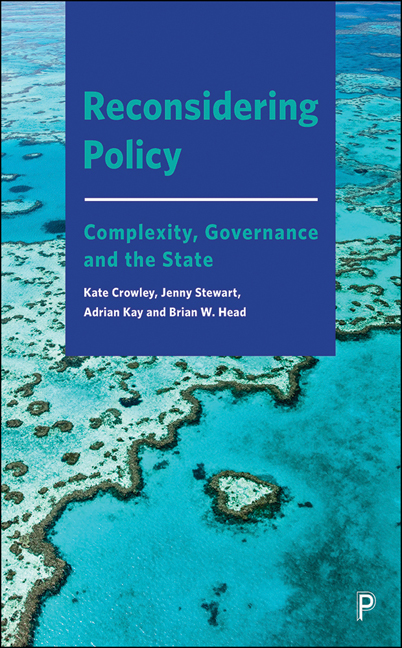Book contents
- Frontmatter
- Contents
- Detailed contents list
- List of tables
- List of abbreviations
- Notes on authors
- Preface: Re-Thinking the Policy Sciences after the ‘Governance Turn’ – Identifying and Creating a (more) Capable State
- 1 Reconsidering Policy – our Agenda
- 2 Reconsidering Policy Systems
- 3 Reconsidering Institutions
- 4 Reconsidering the State
- 5 Reconsidering Borders
- 6 Reconsidering Advice and Advisory Systems
- 7 Reconsidering Information
- 8 Reconsidering Implementation
- 9 Reconsidering Policy Change
- 10 Reconsidering Policy – our Agenda Revisited
- References
- Index
4 - Reconsidering the State
Published online by Cambridge University Press: 23 February 2021
- Frontmatter
- Contents
- Detailed contents list
- List of tables
- List of abbreviations
- Notes on authors
- Preface: Re-Thinking the Policy Sciences after the ‘Governance Turn’ – Identifying and Creating a (more) Capable State
- 1 Reconsidering Policy – our Agenda
- 2 Reconsidering Policy Systems
- 3 Reconsidering Institutions
- 4 Reconsidering the State
- 5 Reconsidering Borders
- 6 Reconsidering Advice and Advisory Systems
- 7 Reconsidering Information
- 8 Reconsidering Implementation
- 9 Reconsidering Policy Change
- 10 Reconsidering Policy – our Agenda Revisited
- References
- Index
Summary
Why the state matters
There is a longstanding, varied and occasionally unruly academic literature on how, why and the extent to which the state should be central to the study of public policy. Much of policy studies accepts the idea of the state as the modern equivalent of the sovereign ruler; a set of enduring political institutions which enjoy a monopoly of formal, legal authority over an organised political community marked by clear territorial borders. In this historical analogy, public policy is the democratically endorsed roadmap or guide for the use of state power to improve, for example, social welfare. Within this taken for granted view, there are two counterpoints in public policy analysis; in broad terms, state-centred and society-centred perspectives, which disagree markedly on the extent to which the state has autonomy, is an organisation with agency, or is essentially a clearing house for outside forces from the market and civil society. The purpose of this chapter is not to reach some resolution of these two positions or stand on one side or the other in terms of their ability to deal with complexity. Instead, we argue that a reconsideration of the state in terms of policy studies for the governance era needs to reflect both perspectives and draw on the blurring of state-society boundaries as a central feature in what is ‘public’ in public policy. In a complementary argument to that presented in Bell and Hindmoor (2009), we advance a claim about the enduring power of the state in policy studies; both as a set of public institutions and organisational arrangements, and an analytical concept to describe the foundations of a polity and sources of authority in policymaking. Building on notions of a policy-making system elaborated in Chapter 2, we reconsider the position of the state in policy studies by investigating the interactions and inter-dependency between the state and society rather than in making a binary choice between state-centred and society-centred governance. We follow Sellers (2011) who argues that scholars should converge around a broadly similar line of inquiry: that society provides crucial elements of support for a state to be effective, and that a state is critical to collective action in society.
- Type
- Chapter
- Information
- Reconsidering PolicyComplexity, Governance and the State, pp. 55 - 74Publisher: Bristol University PressPrint publication year: 2020



